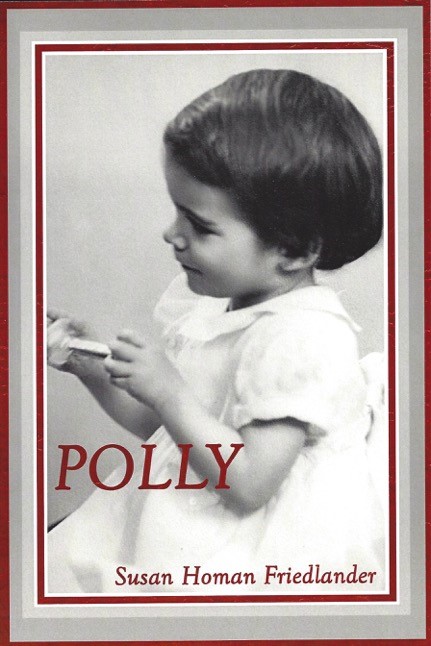
BY JUDY CARMACK BROSS

Susan Homan (Kimball) Friedlander began life in a lovely Cincinnati 1950’s household– a beautiful, elegant mother, Willamay Homan, a handsome father, David, trips to Florida every winter. In her new book, Polly, Susan writes about what happened when her little sister was born two years later, and of family ties against all odds. It is a story not of adults but of two children.

Susan, who would move to Lake Forest and raise her three children, Annie Kimball, David Kimball and Jenny Kimball Brown there, recently read the following from her book at Coterie, a legendary Lake Forest group of women who love to write stories.
I’m opening my presents and not paying attention to Polly. She’s just looking off at nowhere like she does, rocking back and forth like always and making her noises. Then mommy says ‘Look, Polly’ and she unwraps a big package that turns out to be a stand up play piano with a real seat and everything. And she picks Polly up and puts her on that seat and Polly starts banging on the keys. She doesn’t care very much though and she stops banging pretty soon.
Just then I open my next present which is a flat little piano with a little keyboard, not half as good as Polly’s. I can’t believe it because I’m bigger and I get to take piano at school next year and Polly doesn’t know how good that big piano is. I should have gotten it and it’s not fair. So I say, ‘Hey, that’s not fair that Polly gets the big piano and I just got this little piano.’ I‘m angry and I say it again.
But mommy’s face turns all mad and cold and she looks like she hates me and she sounds tired and sick of me and says, ‘How can you say that? You have everything and Polly has nothing.’
I shoot Polly a mad look, but then I feel worried and scared inside and ashamed and angry all at once because Polly can’t do anything and she’s sick and I’m not and I shouldn’t give mean looks to someone who’s so sick.
I hate that stand up piano. I wish I could break it!
Polly had been born three months prematurely and had also had too much oxygen in her incubator. Susan explained her condition:
The official diagnosis in today’s terminology is Intellectual Developmental Disorder. The disorder has four levels and Polly’s were always severe and profound, the highest levels. She spent over 60 years at the Woods School in Langhorne, Pennsylvania. We were fortunate that a trust from our grandmother paid for her outstanding care at Woods, where she was so loved. When my mother died I became her guardian. I never viewed this as if it were simply a responsibility: she was my sister whom I loved. Polly died last winter. I began writing about Polly years ago, but I self-published her story after she died because I wanted her life to matter.

Although Polly has just been released, the story of the sisters is already helping those who are faced with similar family challenges.
There are so many complicated emotions, and they are all real. I believe that families have to talk about their experiences, whether they be with a handicapped child, or a failing adult. Silence creates the biggest wall, and leads to such isolation. I wanted my book to be a comfort to people, and to encourage people to acknowledge their emotions and to know that so many of those emotions are unavoidable – and often even necessary.
My mother had known almost since Polly’s birth that she was dealing with a severely disabled child and I think she had already come to terms with the realities of Polly’s life by the time we took her to Woods. I believe it was different for me. Polly was my little sister and I had been with her every day as a child. In a way it was as if I were suddenly an only child, which felt so sad. Even as a teenager I often thought that if things got bad I would go get Polly, and we would live together on an island.
For five years Susan and her mother visited Polly.
One day Polly doesn’t know us. It’s as if we’re strangers. Before that day there has always been a faint vestige of recognition. Now there is none. I don’t remember my mother’s feelings. For me, it’s a death of sorts and I’m devastated. This time I can’t stop crying, and I’m still red-eyed and distraught during dinner in New York many hours later. She is my baby sister and I love her, but she doesn’t know me any more.
The Director tells us, very gently, ‘Don’t come any more. Polly doesn’t know you or Susan and she doesn’t know the difference. She is well taken care of. You know she’s fine. You can call us at any time. Don’t come back anymore Mrs. Homan. There’s no reason to do so.’
And we don’t.
As Susan visited Polly as an adult, first with her late husband Paul Kimball, Susan saw a person who had become a rigid, severely handicapped adult, who could barely communicate in any way. But Susan still drew great comfort by visiting Polly at her house at Woods, where she lived with 36 women from 14 to 75, the most handicapped women at Woods.
Years later, due to severe complications, Polly had to be taken off lithium, which had given her some amount of peace. Susan explained:
She had lived for 31 years, always in her own world, but at least peaceful and comfortable, and able to be somewhat self-sufficient -until her lithium had to be taken away. Now she was shrieking and inconsolable, escaping from her wheelchair.
Susan suddenly remembered how much her little sister had always liked her records, and she bought her headphones, all sorts of CDs, and gathered up her own favorite music. That Christmas a big box of CD’s—from classics to Celtic to country—arrived for Polly. Immediately Polly became a changed person, wearing the headphones all the time, calming down completely, even tapping her foot to the music.
I have always, always loved Polly, though there has never been one thing about her life that has made any sense to me. Yet here she has been and here she still is, and for once – only once – I stumbled on to something that helps her, something that brings her some peace, maybe even a little joy. What a great gift I was given when I remembered how much she had loved music as a child, and when it turned out that music made such a tremendous difference in her present life.

As music brought joy to Polly, her sister’s book brings a message to remember for all who cherish family ties.







